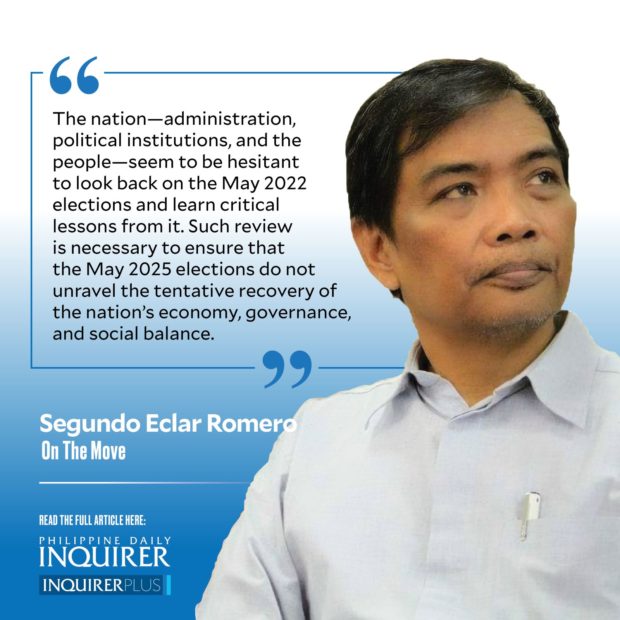Tying loose ends before the May ’25 polls

These political assassinations seem to be reversing the May 2022 election results by “other means.” If so, this adds a dimension of necessity and urgency to our neglected collective task—reviewing the way we conducted the last elections. Without reviewing the May 2022 election systems, we are once again taking to the open sea in May 2025 with a fragile political vessel, imagining that it can withstand potentially turbulent political waters. We need to take the time to inspect our vessel for those cracks that must be patched and weaknesses that must be reinforced.
The nation—administration, political institutions, and the people—seem to be hesitant to look back on the May 2022 elections and learn critical lessons from it. Such review is necessary to ensure that the May 2025 elections do not unravel the tentative recovery of the nation’s economy, governance, and social balance.
Article continues after this advertisementThe current mood of national recovery is an auspicious time for this review of the electoral process. The losing candidates in the last elections, including Leni Robredo, have accepted the results of the election and have no intention of seeking to overturn them. The Supreme Court has also recently enjoined the Commission on Elections (Comelec) and other respondents to comment on the petition for mandamus by the trio—Eliseo Rio Jr., Gus Lagman, and Franklin Ysaac—for the transmission logs during the May 2022 elections to be preserved.
The new administration is now eight months in power. It has been a smooth political transition. The clear 2:1 electoral victory of Ferdinand Marcos Jr. over his nearest rival Robredo has preempted all potential protests against the victory. This situation enables the country to move on with the business of recovering from the pandemic and its wicked problems of poverty, corruption, and poor governance. It allows people to suspend the unresolved issues of the Marcos martial law regime to give sufficient elbow room for the comebacking Marcos scion to gain traction and slowly win the approval of the people.
It is in this light that the nation should sit up and listen when Comelec chair George Garcia, Parish Pastoral Council for Responsible Voting (PPCRV) chair Evelyn Singson, and Legal Network for Truthful Elections (Lente) president Rosario Setias-Reyes assess our readiness to conduct the May 2025 elections with higher levels of transparency, credibility, and order. They will speak in a forum on “Lessons Learned on How Our Elections Can be More Transparent, Accurate, and Credible.” The event will be held entirely online on Wednesday, March 22, from 3 p.m. to 5 p.m. (Zoom ID 848 5789 8311, Password 224836) and live-streamed from the Vinzons Policy Center (VPC) Facebook page. Carlo Vistan, dean of the UP College of Law and himself an election lawyer, will be the reactor to the speakers.
Article continues after this advertisementVPC and the UP Alumni Association are sponsoring this event, which is free and open to the public. VPC is a group of policy analysts and advocates of responsible governance and citizenship from the University of the Philippines.
Among the issues I would want the speakers to address are:
If the Smartmatic voting machines are now too old and prone to malfunction, what provisions are being made by Comelec for their rehabilitation or replacement?
Which of the findings and recommendations of the International Observer Mission and the Asian Network for Free Elections are the Comelec and Congress taking any action on?
What organizational transformation in Comelec strategy, systems, structure, and staff is ongoing or planned, and which budget support enables this?
How (principles and process) does Comelec respond to citizen petitions for post-election transparency in the results and process of elections?
What proposals for improving the democratic political contestation by political parties and candidates would Comelec, PPCRV, and Lente present should a Charter change process materialize?
This forum on getting ready for the upcoming May 2025 elections will be the first in a series of five planned VPC events that will deepen the civic conversations on the Philippine electoral system.
doyromero@gmail.com
















